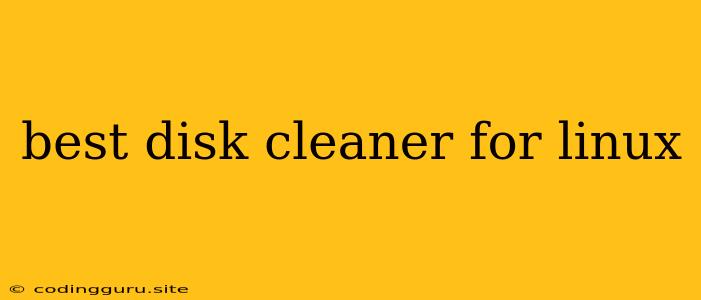Finding the Best Disk Cleaner for Your Linux System
Linux is known for its efficiency and resource management, but even the most efficient system can accumulate unnecessary files over time. These files can clutter your hard drive, slow down your system, and even create security risks. This is where disk cleaners come in handy. They help you identify and remove unwanted files, freeing up valuable disk space and improving your system's performance. But with so many disk cleaners available for Linux, how do you choose the best one?
What Makes a Good Disk Cleaner?
Here are some essential features to look for in a Linux disk cleaner:
- User-Friendly Interface: A good disk cleaner should be easy to use, even for beginners. It should have a clear and intuitive interface that allows you to quickly scan your system, identify unwanted files, and remove them safely.
- Comprehensive Scanning: The disk cleaner should be able to scan all parts of your system, including your home directory, system directories, and temporary files. It should be able to detect different types of unnecessary files, such as log files, cache files, browser history, and temporary downloads.
- Accurate File Detection: The disk cleaner should be able to accurately identify unwanted files without accidentally deleting important files. It should have a mechanism for previewing files before deletion and provide options to exclude specific files or directories from the cleaning process.
- Safety Features: A good disk cleaner should prioritize data safety. It should have safeguards against accidental deletion of important files and provide options for creating backups before performing any cleaning actions.
- Advanced Options: Some disk cleaners offer advanced features like scheduling automatic cleaning, customizing scan criteria, and integrating with other system utilities. These features can further enhance your cleaning experience and make the process more efficient.
Popular Disk Cleaners for Linux
Here are some popular disk cleaners for Linux that you can consider:
1. BleachBit:
BleachBit is one of the most popular disk cleaners for Linux. It offers a wide range of features, including cleaning various applications, deleting temporary files, clearing browser history, and shredding sensitive data. It has a user-friendly interface and provides detailed information about the files it identifies.
2. Sweeper:
Sweeper is another popular disk cleaner that focuses on cleaning your system efficiently. It automatically detects and removes temporary files, log files, and other unnecessary files. Sweeper also offers a feature to clean up the system registry, which can further enhance performance.
3. Disk Usage Analyzer:
Disk Usage Analyzer is a tool designed to help you understand your disk space usage. It visualizes your disk space allocation and highlights large files and directories that are consuming the most space. While it's not a traditional disk cleaner, it can be helpful in identifying files to manually delete or move to free up space.
4. Baobab:
Baobab is a graphical disk usage analyzer that provides a visual representation of your disk space usage. It allows you to easily explore your hard drive, identify files and directories that are taking up the most space, and delete or move them to free up space.
5. Gnome Disk Utility:
Gnome Disk Utility is a built-in tool in many Linux distributions that offers basic disk cleaning features. It allows you to clean up temporary files, empty trash, and manage partitions. While it doesn't offer as many features as dedicated disk cleaners, it's a good starting point for beginners.
Tips for Using Disk Cleaners
- Back Up Your Data: Before using any disk cleaner, it's crucial to back up your important data to prevent accidental deletion.
- Read Reviews and Documentation: Familiarize yourself with the disk cleaner's features, limitations, and safety features before using it.
- Start with a Scan: Before deleting any files, run a scan to identify unwanted files. Review the results carefully and ensure you understand what you're about to delete.
- Use the Preview Feature: Most disk cleaners have a preview feature that allows you to see the files before deleting them. Use this feature to double-check that you're not accidentally deleting any important files.
- Customize Your Cleaning Process: Many disk cleaners allow you to customize the cleaning process, such as excluding specific files or directories. This allows you to tailor the cleaning process to your specific needs.
- Use Disk Cleaners Regularly: For optimal system performance, it's recommended to run a disk cleaner regularly, at least once a month or more frequently if you're using your system heavily.
Conclusion
Choosing the best disk cleaner for your Linux system depends on your individual needs and preferences. Consider the features, ease of use, and safety features of different disk cleaners before making a decision. Regularly cleaning your system with a disk cleaner can help you improve your system's performance, free up valuable disk space, and maintain the health of your hard drive.
